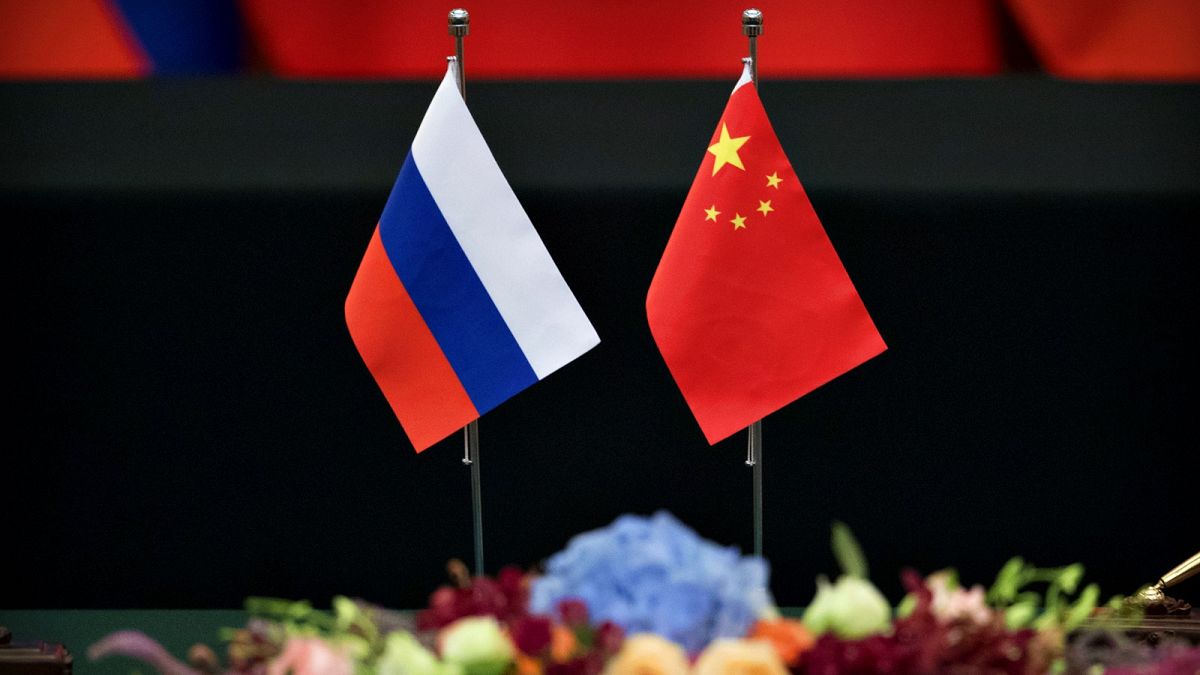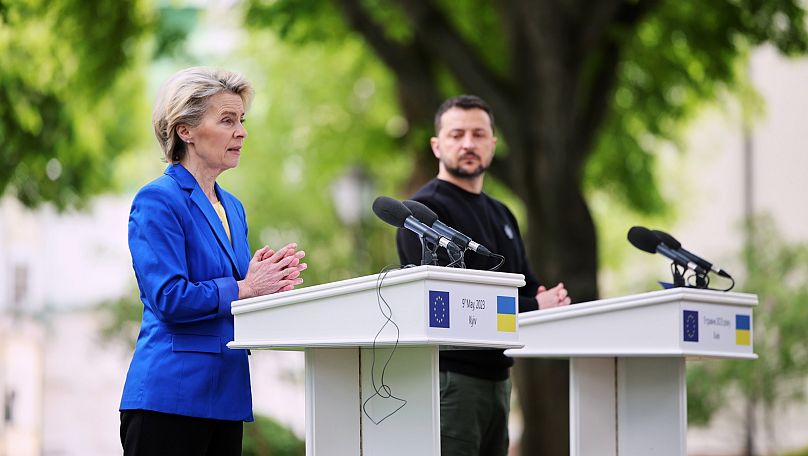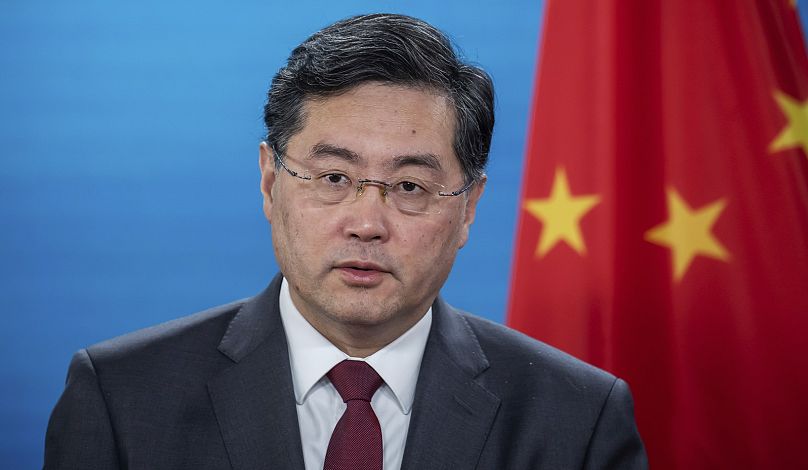The EU is discussing plans to chase after those suspected of helping Russia evade international sanctions.
The European Union wants to make sanctions work – but just how far will it go?
As part of its 11th round of sanctions, the European Commission has proposed new measures to "crack down" on circumvention, as Ursula von der Leyen put it during a trip to Kyiv to mark Europe Day.
With most EU-Russia trade heavily restricted or downright prohibited, Brussels is now pointing the finger at people, companies and even entire countries suspected of helping Moscow evade the penalties by acting as transit destinations for EU-made products that are, coincidentally, under sanctions.
"We've recently seen a growth of highly unusual trade flows between the European Union and certain third countries – these goods then end up in Russia," von der Leyen said.
Although the proposal's details were not made public, the new mission to chase after Russia's enablers immediately raised the spectre of a scourge that has for years haunted the bloc: extraterritoriality.
The limits of jurisdiction
As a foreign policy tool, sanctions are applied at the discretion of sovereign countries to punish what they consider to be unlawful, or at least objectionable, behaviour conducted by another person, entity or state. While in most cases the reprehensible behaviour continues in defiance of international censure, as Russia's war clearly proves, sanctions can serve additional purposes, such as economic pressure, deterrence, isolation and criticism.
Assets freeze, travel bans and trade restrictions are among the most common restrictive measures rolled out. But one common denominator remains: sanctions are introduced within the jurisdiction of the sanctioning country.
In fact, even if we talk about sanctions against Russia, in reality, the sanctions are not imposed inside Russia as the EU, for obvious reasons, lacks jurisdiction across the country's territory. What the bloc does instead is impose obligations on its own member states and companies over their interactions with Russia. For example, European firms are prohibited from importing Russian coal.
This way of working grants countries a fairly wide margin of action, from targeted restrictions on certain key products to broad bans that encompass entire sectors.
In recent years, however, a new strategy to enforce maximum compliance has emerged, most notably from the United States which has promoted the use of extraterritoriality, also known as secondary sanctions, on entities that fall strictly outside its jurisdiction.
One such case was when the administration of former President Donald Trump pulled out of the Iran nuclear deal, re-introduced sanctions that had been previously lifted, and threatened to punish companies still doing business with Teheran, regardless of their geographic location or ownership.
Brussels reacted with outrage: Why would European firms abide by American law? Why would European investors pay the price of a decision unilaterally taken in Washington?
But the mere thought of losing access to the dollar sent chills down the spine of Europeans, who were forced to choose between America's mighty financial market and Iran's troubled economy.
"We're talking about the extension of the reach of domestic law overseas. These are extraterritorial sanctions which mostly discourage companies and individuals of third parties to do business with the targeted countries," Viktor Szép, an assistant law professor at the University of Groningen, told Euronews.
"The US is basically extending its jurisdiction to non-US persons on a quite wide scale. And given that many large companies have links with the US, then US laws have considerable outreach, especially in the field of international banking."
The EU has traditionally opposed any sort of extraterritorial sanctions, arguing they impinge on its sovereignty and independence. Its fierce resistance was carved in a 1996 law known as the Blocking Statute, a direct reply to US sanctions imposed on Iran, Cuba and Libya.
The statute forbids EU operators from complying with extraterritorial sanctions, nullifies rulings issued by foreign courts and allows the seeking of compensation for damages. It was later updated to counteract American retaliation in the Iran case, although the exodus of European companies from Teheran was by then uncontainable.
"The European Union has always seen extraterritorial sanctions as something which goes against international law," Szép said. "EU sanctions have never been extraterritorial, which means they do not apply to non-EU companies or individuals that do business entirely outside the Union."
That long-established opposition was pushed to the limit last year when the G7 introduced its price cap on Russian crude oil. On paper, the cap was a primary sanction. But in practice, it reverberated across the world as many other countries were constrained to follow the cap in order to get hold of cheap Russian oil, whose commerce depends on Western insurance and shipping firms.
Pushing the envelope
Diving head-on into extraterritoriality would undoubtedly represent a major leap for the EU’s foreign policy and add to a record of major taboos broken since the Kremlin launched the invasion.
In the 8th package of sanctions, the bloc agreed on a provision to blacklist individuals of any nationality that facilitate the evasion of penalties. The 11th round would go much further, targeting companies, or even entire countries, accused of selling sanctioned goods to Russia.
But to force non-EU entities to abide by EU law, the bloc will need leverage that is strong enough to make others think twice.
The US enforces its sanctions globally by employing the dollar as a carrot and stick. The euro alone is unlikely to replicate the dollar's deterrent effect, meaning the EU will have to come up with additional economic elements to wield as a bargaining chip.
"The European Union is, to some extent, a newcomer in the arena of secondary sanctions," Tom Ruys, a professor of international law at Ghent University, said in an interview.
"Europe does not have the same clout as the United States does with its access to the US financial system, with the weaponisation of the dollar, which is still vital for a wide range of financial institutions worldwide. I'd say this is something unique to the United States."
According to Ruys, the EU has three possible avenues to clamp down on circumvention: restricting access to its wealthy internal market, launching criminal proceedings in national courts against those suspected of sanctions evasion, and adding more companies to the bloc's blacklist.
The blacklist is seen as the safest option thanks to its iron-clad track record and its somewhat limited scope: in practice, it translates to asset freezes and travel bans, something akin to name-shaming. By simply listing non-Russian companies, experts say, the EU could narrowly avoid the use of extraterritorial measures and the full-blown retaliation that comes with it.
But others might see things differently. China, a country that is under scrutiny for its close military and economic ties with Russia, has issued an unambiguous warning to Brussels.
"We are against states introducing extraterritorial or one-sided sanctions on China or any other country according to their own domestic laws. And if that were to happen we would react strictly and firmly," said Qin Gang, China's foreign affairs minister, in a visit to Berlin.
The possibility of Chinese countersanctions, the likes of which the EU has suffered in the past, could see member states steer towards a much more targeted approach, possibly focused on curbing specific exports rather than punishing companies or countries, said Maria Shagina, a senior research fellow at the International Institute for Strategic Studies (IISS).
"Berlin and Paris are allergic to any use of extraterritorial sanctions, so the new designations will have to have an EU nexus, meaning that a third country can be added to the EU sanctions list if EU sanctions are violated. Nevertheless, this is evidence of a more assertive and geopolitical EU willing to push the envelope," Shagina told Euronews.
"The big question is, which countries will end up on the list? Kazakhstan and Armenia are more likely than China or Turkey."
Von der Leyen has tempered that the upcoming mechanism will be used "cautiously," as a "last resort" following a "very diligent risk analysis". This reflects the awkward position the EU is in today, caught between its aversion to extraterritoriality and its desire to make sanctions work.
Regardless of the final outcome of negotiations, the next round of sanctions will have to deal with the same inherent weakness that has dented the effectiveness of the previous ten rafts: while EU sanctions are designed and agreed upon collectively, their enforcement takes place on a national basis, making them prone to asymmetrical results.
By contrast, the US implements its penalties with the full prowess of its federal government.
"Whenever new sanctions are invented, the targets will adjust themselves, creatively seeking ways to circumvent those measures, especially now where the stakes are so high because the target is one of the major economies in the world. The incentive to exploit loopholes in the fabric is also much more prevalent," said Tom Ruys.
"It's a constant cat-and-mouse game. And we haven't seen the end of it."


